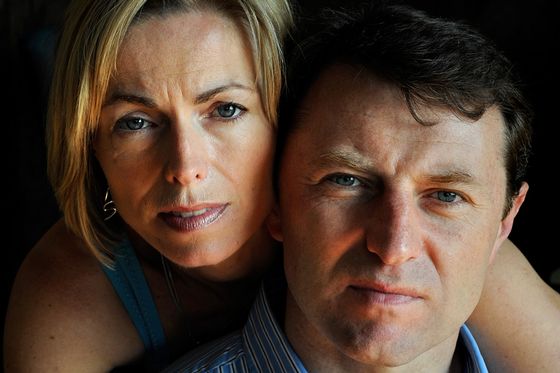 |
|
Kate
McCann, with her husband Gerry: 'Wednesday, May 2, was our
last completely happy day. Our last, to date, as a family of
five. If only it were possible to rewind. Even for an
hour'Photograph: TNL |
Kate McCann, whose apparently controlled response to her daughter
Madeleine’s abduction four years ago turned her into a hate figure,
has revealed her near-suicidal anguish and how deep depression
threatened to destroy her marriage.
Madeleine was
three years old when she was snatched from the McCanns’ holiday
apartment in Praia da Luz, Portugal, as her parents dined with
friends on the final night of a spring break in May 2007.
Madeleine and her
brother and sister, twins Sean and Amelie, now aged six, had been
left alone in the apartment while Kate and Gerry McCann dined close
by, checking on the children every half-hour.
On one of these
checks Kate McCann discovered the bedroom window open, the shutter
raised from the outside and her daughter missing. She ran outside
screaming, “Madeleine’s gone! Someone’s taken her!” However, during
the following days McCann appeared curiously composed.
Her new book,
Madeleine, tells the story of her daughter’s disappearance. She says
she went into shock. “It’s quite frightening when I see myself in
those early days,” she says. “To me I look incredibly fragile and
confused and lost.”
Within hours of
Madeleine’s kidnapping, internet forums were abuzz with comments
from people who did not believe the couple’s story or regarded Kate
McCann as “a cold, emotionless woman” — criticism that intensified
as interest in the story turned to near-hysteria.
In private she
was breaking down in front of friends and relations who had flown to
Portugal to care for her.
She writes: “I
had an overwhelming urge to swim out across the ocean, as hard and
as fast as I could; to swim and swim and swim until I was so far out
and so exhausted I could just allow the water to pull me under and
relieve me of this torment.
“I wasn’t keeping
that desire to myself, either. I was shouting it out to anyone who
happened to be in the room. Both this urge and the expression of it
were, I suppose, an outlet for the crucifying anguish.
“Somehow,
inflicting physical pain on myself seemed to be the only possible
way of escaping my internal pain. The other truly awful
manifestation of what I was feeling was a macabre slide show of
vivid pictures in my brain that taunted me relentlessly.
“I was crying out
that I could see Madeleine lying, cold and mottled, on a big grey
stone slab. Looking back, seeing me like this must have been
terrible for my friends and relatives, particularly my parents, but
I couldn’t help myself.”
She continued to
have “flashes of Madeleine in my head being hurt, abused and
screaming for us”. After the couple returned to Britain without
their daughter, she fell into a depression.
She became
obsessed with Madeleine, her mind full of dark imaginings, to the
exasperation of her husband whose ability to “switch off” seemed
almost callous to her.
“Gerry was
functioning much sooner than I was. I sometimes found it almost
offensive as if somehow he wasn’t grieving enough,” she writes. “He
would suggest doing something nice — and I would cry.”
Her every waking
moment was suffused with a sense of Madeleine’s suffering and fear.
“It was a long time before I was able to allow myself to take real
pleasure in anything. I couldn’t watch television, read a book,
listen to music... How could I possibly take pleasure in anything
without my daughter?”
She has written
the book to raise money for the Find Madeleine campaign. The McCanns
would like the British government to urge the Portuguese to review
the case.



